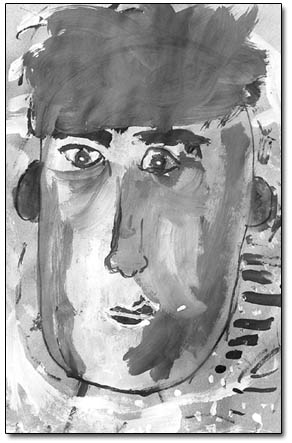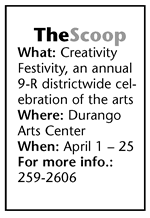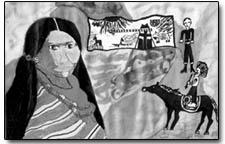|
Creativity Festivity
showcases vivid imaginations of local youth written by Missy Votel
 |
Works by Animas Valley third-grader
Brad Coffett, above, and Riverview fourth-grader
Sarah Bolton, below, will be among those displayed
at the Creativity Festivity art
show beginning April 1 at the Durango Arts Center. |
For many a river rafter, Styrofoam is merely something
that keeps beer cold. But for three adventurous women,
it was the only thing separating them from a frigid torrent
of whitewater for 19 days.
In November 2001, three friends – Julie Munger,
40, Kelley Kalafatich, 40, and Rebecca Rusch, 33 –
set out on the icy waters of the Colorado River through
the Grand Canyon with nothing but 4-foot foam boards,
flippers, dry suits and gumption to guide them down the
300-mile stretch and into river history. The resulting
documentary, “Three Women, 300 Miles,” is
a sometimes-harrowing, oftentimes-humorous and always
awe-inspiring look at the resiliency of the human spirit
in accomplishing what many said could never be done.
 Although
the film takes place in 2001, the real story began two
years before when veteran river runners Kalafatich and
Munger, along with another friend, hatched a plan to be
the first people – male or female – to run
the Grand on river boards (think boogie boards on steroids).
However, just as the women were about to cast off, they
were stopped by a park ranger on the grounds that what
they were about to do was against the law. Although
the film takes place in 2001, the real story began two
years before when veteran river runners Kalafatich and
Munger, along with another friend, hatched a plan to be
the first people – male or female – to run
the Grand on river boards (think boogie boards on steroids).
However, just as the women were about to cast off, they
were stopped by a park ranger on the grounds that what
they were about to do was against the law.
“Since the ’60s it’s been illegal to
swim the Grand Canyon,” said Kalafatich, who was
in Durango last weekend for the film’s world premiere.
“The ranger said, ‘I’m sorry but I can’t
let you go because it’s illegal,’ and pulled
us off.”
Not ones to back down from a challenge, the women began
a tireless quest to win the fight. After some digging,
they found that technically they could run the river on
river boards since the boards are U.S. Coast Guard certified
vessels.
 “So
they had to let us go,” said Kalafatich. “So
they had to let us go,” said Kalafatich.
Two years later with permit in hand, Kalafatich, Munger
and fellow U.S. Whitewater Rafting Team member and adventure
racer Rebecca Rusch, set off into the unknown, towing
what they needed to survive for the next few weeks.
The film picks up at this point, meeting up with the
women on a blustery November day near the put-in at Lee’s
Ferry. Filmed by Kalafatich and Carr Clifton – who
shot footage at the put-in, take-out and a few hike-access
points along the way – “Three Women”
opens with an honest look at pre-expedition jitters. Despite
her Eco-Challenge credentials, we find Rusch, the least
experienced river runner of the three, having second thoughts.
Unlike many films in the extreme adventure genre that
showcase emotionless machismo, it is refreshing to see
some human sentiment as Rusch grapples with paring down
her gear and makes a teary farewell call to a friend,
questioning what she has gotten herself into. However,
she is goaded into staying by trip leader Munger, who
was born with paddle in hand and has nearly 40 canyon
trips under her belt.
“There’s no such thing as bad weather; there’s
just not enough clothes,” Munger chides, later adding,
“All you need is good humor, good sense and a good
sense of humor.”
However, we soon learn that Munger also has a healthy
respect for the river, particularly for Granite Rapid,
a mandatory-thrasher deep within the inner gorge. We also
learn later, at the infamous Lava Falls, that the river
does not play favorites.
Clifton, a landscape photographer from Northern California
whose first foray into moving pictures was with this film,
said he drew upon his own personal Grand Canyon as an
oarsman on the Grand when trying to capture the essence
of the river.
“I had dry heaves after running Granite,”
he said. “And when you’re making a film, the
biggest challenge is figuring out how to do tell it the
best way you can. I tried to recreate the feeling I had.”
Once on the river, the trio finds its groove and comes
to the realization that it just might be successful. However,
before the team can become too cocky, a bizarre accident
turns the tables, almost ending the mission and lending
credence to the old river doctrine that 90 percent of
all accidents happen on shore. Despite the adversity,
the team perseveres, possibly making victory and its pursuit
all the sweeter. And in the process, they even manage
to have some fun, frolicking in the numerous side canyons
and tributaries.
Although at its heart a whitewater action film, to its
credit, “Three Women” doesn’t rely on
the standard formula of hairball descents, blaring speed
metal and breakneck editing. Rather, like the river itself,
it meanders along, picking up speed where appropriate
while still slowing down to enjoy the scenery once in
a while. Adrenaline is not had at the expense of cheap
stunts, disco helmets or radical camera angles. Instead,
one gets it from the unmistakable, deafening roar of an
approaching rapid, the site of its tumbling, tumultuous
waters and the pure exhilaration of being delivered safely
to its bottom.
For anyone who has ever stood for what seemed an eternity
on a rocky shore scouting their line, the film will bring
back the all-too-familiar pit in the gut and knees of
Jell-O. But this is not to say the movie’s power
will be lost on the landlubbers among us. In fact, Kalafatich
said the film, which won Best Documentary at this year’s
Durango Film Festival, is appreciated by river runners
and nonriver runners alike.
“Last Monday when Rebecca came through Lava, the
whole crowd started clapping and cheering,” she
said. “Women came out, and they were crying, thanking
me for such an inspiring film.”
Indeed, after the film’s Friday afternoon screening,
Kalafatich experienced a similar response, with many moviegoers
taking her by the hands and telling her how moved they
were. And lest anyone be misled into thinking “Three
Women” is a chick flick, Kalafatich was quick to
point out that the response has been equally shared by
both sexes.
“What’s amazing to me is men – not
just women – come up with tears in their eye,”
she said. “It’s amazing to get such an emotional
response. People – it just touches them.”
|

